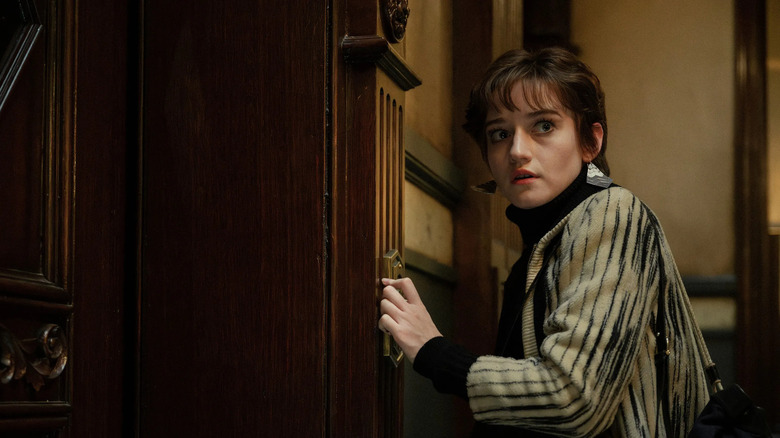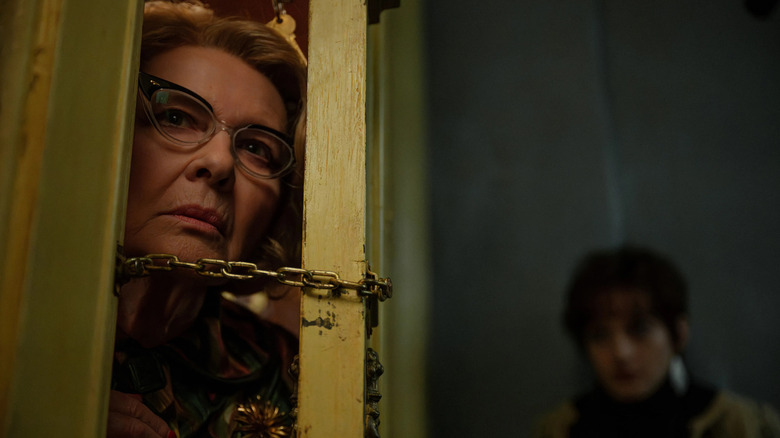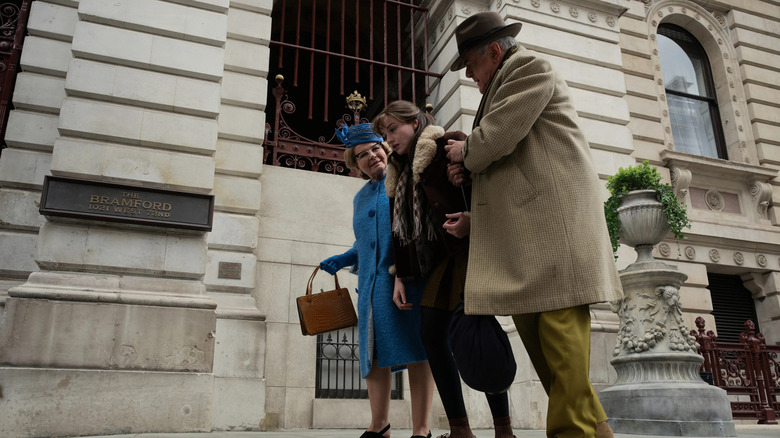Apartment 7A Review: This Rosemary's Baby Prequel Is So Boring It's Scary
Earlier this year, "The First Omen" arrived in theaters, offering us a prequel to the 1976 Satanic horror pic "The Omen." In theory, this sounded like a bad idea: a lazy way to cash-in on brand awareness without offering anything new to the horror genre. But surprise, surprise! "The First Omen" turned out to be surprisingly good, especially for a studio mandated horror prequel. It may not have set the box office on fire, but in the sturdy hands of filmmaker Arkasha Stevenson, "The First Omen" was smart, captivating, and most of all, scary. Now, here comes "Apartment 7A," which is following a similar formula: It's another prequel to a devil-themed horror classic, in this case Roman Polanski's "Rosemary's Baby." My knee-jerk reaction was to be skeptical to this entire endeavour, but I was also skeptical about "The First Omen," and that turned out to be a wonderful surprise. Could it happen again?
Sadly, lightning has not struck twice, and "Apartment 7A" is everything I feared "The First Omen" would be. It's bland, it's unscary, and worst of all, it's pointless. To be fair, "Apartment 7A" has much bigger shoes to fill. "The Omen" is a fun horror movie, but it's also kind of silly and trashy (in an enjoyable way). "Rosemary's Baby," in contrast, is one of the greatest horror movies of all time — an elegant, perfect film that expertly draws you into its story. Polanski, remaining very faithful to Ira Levin's novel, crafted a horror movie that's almost deceptively simple and stripped-down — aside from some dream sequences (that aren't actual dream sequences, they're really happening!), "Rosemary's Baby" keeps traditional horror imagery off screen.
And yet, through the power of suggestion ("He has his father's eyes!"), the film is terrifying. Much of the horror arises not so much through the threat of the supernatural, but from the way the main character, Mia Farrow's Rosemary Woodhouse, is mercilessly gaslit by literally everyone around her, including her husband, through almost the entire film. "Rosemary's Baby" also makes us complicit in that gaslighting: in hindsight, we know that Rosemary was correct — her neighbors were Satanists and her husband was in league with them. But the film, and Farrow's performance, both work hard to make us question everything. I rewatched "Rosemary's Baby" in preparation for "Apartment 7A," and was particularly struck at how Farrow plays the lead role, especially as the film draws to its chilling conclusion: when she rattles off the evil conspiracy she thinks is building against her, she sounds crazy, even though she's right.
"Apartment 7A" contains none of this elegance. "The First Omen" benefited from wisely inventing a new main character to follow, which in effect kept things surprising. Sure, having seen "The Omen," we knew where the story was headed, but the path to get there was shrouded in mystery. That's not the case for "Apartment 7A," which focuses on a character from "Rosemary's Baby" whose fate is pretty well established. Who is this movie for, exactly? People who haven't even heard of "Rosemary's Baby"? That can't be the case, as "Apartment 7A" is loaded with callbacks to Polanski's classic. But the only way anything here really packs a punch is if you've never seen the film that inspired it.
Apartment 7A gives us a backstory we don't need
In "Rosemary's Baby," Rosemary Woodhouse and her husband Guy move into the Bramford, a slightly run-down New York City apartment building with a sordid history. Once there, they befriend their elderly neighbors, Minnie and Roman Castevet, who seemed overly pleasant but turned out to have a dark secret. During an early scene in the film, Rosemary goes into the basement of the Bramford to do some laundry, and while there, she meets a young woman named Terry Gionoffrio, who tells her she's living with the Castevets. I guess I shouldn't say any more about Terry and her fate to avoid giving away "Apartment 7A" spoilers, but if you've seen "Rosemary's Baby," you know exactly what happens. "Apartment 7A" tries to give us more backstory about Terry — but it's backstory we don't really need.
In "Apartment 7A," Terry is played by Julia Garner, a highly talented performer who is doing the best she can here with subpar material. As the film begins, it's 1965, and Terry has just suffered a terrible injury while performing in a Broadway show. Four months go by, and Terry is desperate to get back on stage — she wants to be a star. Unfortunately, it's tough out there for a struggling actor, and on top of that, Terry has gotten hooked on painkillers. After bombing an audition for a new musical, Terry, stoned, follows the play's writer (Jim Sturgess) back to his apartment building, the Bramford, assuming she can convince him to give her the part. Unfortunately, the sickly Terry collapses on the street outside the building and is rescued by kindly elderly couple Minnie and Roman Castevet, played by Dianne Wiest and Kevin McNally. Wiest does an enjoyable enough impression of Ruth Gordon, who so memorably played Minnie in "Rosemary's Baby," while McNally, stepping into the shoes of Sidney Blackmer, does a little better making the character his own.
Minnie and Roman offer Terry a life-preserver: they not only have their own place in the Bramford, but they also pay for a completely separate, empty apartment, and they say Terry can live there rent-free. This is just one of several instances where "Apartment 7A" changes things from "Rosemary's Baby" — in that film, Terry plainly states she's living with the Castevets, not in her own apartment. In addition to that, there's a scene in "Apartment 7A" where Terry spots a young blonde woman in the laundry room. I'm assuming this is supposed to be Rosemary, but she and Terry never interact as they do in "Rosemary's Baby." What's more, the timeline doesn't add up: "Rosemary's Baby" tells us that Rosemary and Guy moved into the apartment of a dead woman named Mrs Gardenia, but when Terry spots this blonde in the basement in "Apartment 7A," Mrs. Gardenia (played by Tina Gray) is still very much alive. What's the point of making references and nods to "Rosemary's Baby" if you're not even going to get them right?
Just watch Rosemary's Baby instead
Perhaps it's unfair to "Apartment 7A" to constantly compare it to "Rosemary's Baby." How is the film on its own? Can it stand on its own two feet as a creepy horror-thriller? No, not really. The movie plods along, failing to ever become interesting, although Garner really is giving it her all. Terry begins to suspect something is seriously amiss with both the Castevets and the Bramford itself, and she finds herself being pressured into making uncomfortable choices that could derail her carer. While the concept of a woman struggling with these issues is solid, in theory, none of this is particularly compelling, nor is it very scary. At one point, Terry stumbles into a church where she encounters a nun who might as well be named Sister Exposition as she clunkily spells out exactly what's going on for both Terry and anyone in the audience who hasn't bothered to watch "Rosemary's Baby."
Director Natalie Erika James, who also co-wrote the script, does manage to create a few strong images from time to time, most notably when a drugged Terry has a lengthy dream that mirrors a Broadway production. The film's production design also does a fairly good job of invoking 1960s New York. But virtually everything here is so muted, so lifeless, that "Apartment 7A" starts to feel like a chore to watch. James and company deserve credit for not loading the movie up with cheap, lazy jumpscares, but none of the mounting dread and unease that blanketed "Rosemary's Baby" is even close to being replicated here.
While "The First Omen" was one of the best recent examples to prove prequels to classic horror movies could be worthwhile, "Apartment 7A" is a reminder that such a feat isn't so simple to pull off. I suppose the best thing to say about "Apartment 7A" is that once it's over, you'll probably immediately want watch the much better "Rosemary's Baby" and wash the dull memory of this movie away.
/Film Rating: 4 out of 10
"Apartment 7A" premieres September 27, 2024 on Paramount+ and will also be available to purchase on Digital the same date.


